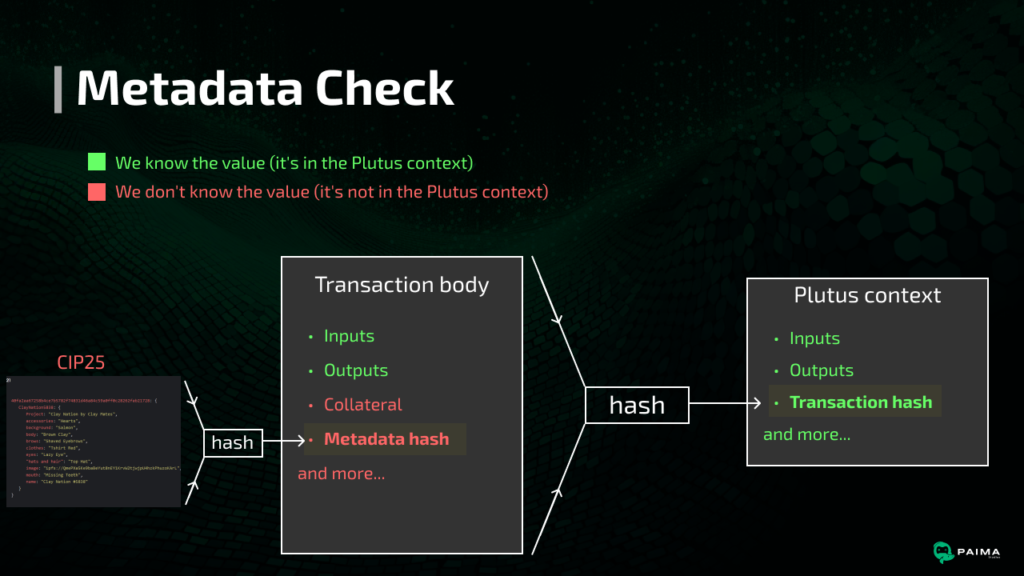-
Cardano CIP25 metadata processing set to improve NFTs and AMMs.
-
With Plutus smart contracts, you can create dynamic NFTs and play complex games on the blockchain.
-
The Inter-Blockchain Communication Protocol (IBC) encourages different chains to work together.
Cardano ($ADA) has recently introduced Plutus script validation of CIP25 metadata, a technical enhancement to improve the functionality of NFTs and Automated Market Makers (AMMs) within its ecosystem. Sebastien Guillemot, co-founder of Paima Studios, announced the new capability for X.
This technical improvement addresses a previous limitation in accessing transaction metadata from Plutus, which had hindered the development of dynamic NFTs and AMMs.
With this update, NFTs on Cardano can evolve based on user actions and interact with AMMs without centralized servers. This development supports creating new interoperability standards and on-chain gaming within the Cardano network.
Introducing Cardano CIP25 Metadata Validation, which Enhances NFTs
Cardano’s introduction of CIP25 metadata validation marks a significant milestone in the evolution of Cardano NFTs. The validation enables NFTs to change dynamically in response to user interactions and integrate seamlessly with AMMs.
This capability is vital for fostering a more interactive and engaging user experience. By leveraging Cardano CIP25 metadata, developers can create NFTs that are static collectibles and functional assets within the ecosystem.
One of the standout features of this update is how it facilitates the interaction between Cardano NFTs and AMMs. This interaction allows for creating more complex and engaging financial products and services, enhancing the overall utility of NFTs.
The integration of CIP25 metadata and the use of Plutus smart contracts make it possible to automate and streamline these processes, reducing the reliance on centralized servers and increasing the ecosystem’s robustness.
Also, Read: Chang Hard Fork Set to Decentralize Cardano’s $13 Billion Blockchain
Plutus-Enabled Gaming
The validation of CIP25 metadata by Plutus smart contracts is also a game-changer for on-chain gaming on Cardano. Using Plutus smart contracts to validate metadata allows developers to create more sophisticated and interactive games.
This new capability opens up many opportunities for on-chain gaming, where in-game assets can be represented as dynamic NFTs that evolve based on player actions.
On-chain gaming on Cardano stands to benefit immensely from this development. Developers can create a more immersive and engaging gaming experience by integrating Cardano NFTs with gaming mechanics.
Plutus smart contracts can automate many aspects of gameplay, such as verifying the ownership and transfer of in-game assets, ensuring a seamless and secure gaming environment.
The Interchain Connection
In addition to CIP25 metadata validation and its implications for Cardano NFTs and on-chain gaming, Cardano has recently implemented the Inter-Blockchain Communication Protocol (IBC) sidechain capabilities.
This upgrade aims to address scalability, data privacy, and interoperability issues by facilitating the transfer of data and assets between different blockchains while maintaining Cardano’s security and fee structure.

With IBC, projects within the Cardano ecosystem can establish bridges with Cosmos SDK chains and other interchain networks. This capability promotes interoperability, enabling developers to leverage diverse blockchain platforms for innovative applications.
Integrating IBC facilitates connections to EVM-based sidechains, offering compatibility for deploying Ethereum-compatible dApps on Cardano’s secure infrastructure.
This upgrade also complements other recent improvements, such as the Chang Hard Fork and the Electra upgrade, further solidifying Cardano’s position as a leading blockchain platform.
By enhancing interoperability and making it easier for developers to create cross-chain applications, Cardano continues to push the boundaries of what is possible in the blockchain space.
Also, Read: Dubai Police Employs Cardano To Secure Its Criminal Investigations.
Enhancing Data Privacy and Security
Cardano’s advancements are not confined to enhancing NFT functionality and promoting interoperability. Focusing on data privacy and security also underscores the platform’s continual progress.
Cardano adopts a multi-layered approach to security, incorporating rigorous peer-reviewed research and formal methods into its protocol design. This ensures that all upgrades, such as CIP25 metadata validation and IBC integration, maintain the highest security standards.
In this vein, Cardano’s attention to data privacy is evident through its use of cryptographic mechanisms that protect user data and secure transactions.
The platform’s architecture ensures that sensitive information is not exposed, thereby maintaining the confidentiality of user interactions and transactions on the blockchain. This approach fosters trust within the ecosystem, as users can feel confident that their data remains protected.
Furthermore, Cardano’s unique Ouroboros consensus algorithm contributes to the network’s security by providing a robust and energy-efficient means of achieving consensus.
By leveraging cryptographic techniques and formal verification, Ouroboros ensures the network remains secure against malicious attacks while promoting sustainable blockchain practices.
Conclusion
Cardano’s advancements in CIP25 metadata validation, Plutus smart contracts, and IBC sidechain capabilities demonstrate its commitment to innovation and interoperability. These developments enhance the functionality of Cardano NFTs and on-chain gaming and pave the way for a more interconnected blockchain ecosystem.
By leveraging these cutting-edge technologies, Cardano provides businesses and developers the tools to create more dynamic, secure, and engaging applications.
For those interested in exploring these new capabilities, now is the perfect time to integrate Cardano’s latest features into your projects.
Cardano offers a robust and versatile platform to bring your ideas to life, whether you want to create dynamic NFTs, develop on-chain games, or build cross-chain applications.
